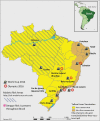Illness in travelers returned from Brazil: the GeoSentinel experience and implications for the 2014 FIFA World Cup and the 2016 Summer Olympics
- PMID: 24585698
- PMCID: PMC7112384
- DOI: 10.1093/cid/ciu122
Illness in travelers returned from Brazil: the GeoSentinel experience and implications for the 2014 FIFA World Cup and the 2016 Summer Olympics
Abstract
Background: Brazil will host the 2014 FIFA World Cup and the 2016 Olympic and Paralympic Games, events that are expected to attract hundreds of thousands of international travelers. Travelers to Brazil will encounter locally endemic infections as well as mass event-specific risks.
Methods: We describe 1586 ill returned travelers who had visited Brazil and were seen at a GeoSentinel Clinic from July 1997 through May 2013.
Results: The most common travel-related illnesses were dermatologic conditions (40%), diarrheal syndromes (25%), and febrile systemic illness (19%). The most common specific dermatologic diagnoses were cutaneous larva migrans, myiasis, and tungiasis. Dengue and malaria, predominantly Plasmodium vivax, were the most frequently identified specific causes of fever and the most common reasons for hospitalization after travel. Dengue fever diagnoses displayed marked seasonality, although cases were seen throughout the year. Among the 28 ill returned travelers with human immunodeficiency virus (HIV) infection, 11 had newly diagnosed asymptomatic infection and 9 had acute symptomatic HIV.
Conclusions: Our analysis primarily identified infectious diseases among travelers to Brazil. Knowledge of illness in travelers returning from Brazil can assist clinicians to advise prospective travelers and guide pretravel preparation, including itinerary-tailored advice, vaccines, and chemoprophylaxis; it can also help to focus posttravel evaluation of ill returned travelers. Travelers planning to attend mass events will encounter other risks that are not captured in our surveillance network.
Keywords: Brazil; dengue; dermatologic; mass gatherings; travelers.
Figures





References
-
- Fédération Internationale de Football Association (FIFA. ). Brazil 2014 promotional tour gets underway in Chile . Available at: http://www.fifa.com/worldcup/news/newsid=1663917/index.html. Accessed 16 March 2013.
-
- Rio 2016 Olympic Games. Available at: http://www.rio2016.com/en. Accessed 16 March 2013.
-
- UK Office for National Statistics. Statistical bulletin: overseas travel and tourism, August 2012. Available at: http://www.ons.gov.uk/ons/dcp171778_282767.pdf . Accessed 7 March 2014.
-
- Barreto ML, Teixeira MG, Bastos FI, Ximens RAA, Barata RB, Rodrigues LC. Successes and failures in the control of infectious diseases in Brazil: social and environmental context, policies, interventions, and research needs. Lancet. 2011;377:1877–89. - PubMed
-
- Abubakar I, Gautret P, Brunette GW, et al. Global perspectives for prevention of infectious diseases associated with mass gatherings. Lancet Infect Dis. 2012;12:66–74. - PubMed
Publication types
MeSH terms
Grants and funding
LinkOut - more resources
Full Text Sources
Other Literature Sources
Medical

